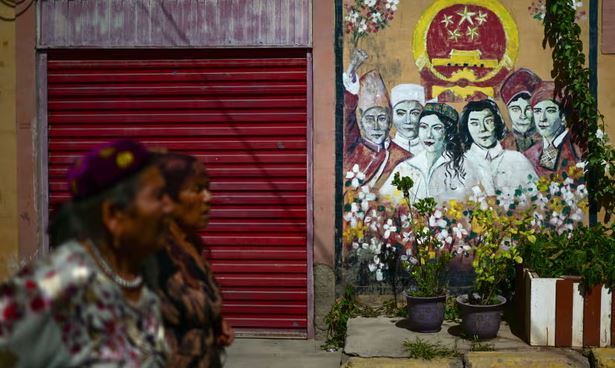Seventy-five years after the founding of the People’s Republic of China, East Turkestan, Tibet, and Southern Mongolia remain under siege
The PRC’s so-called autonomy—such as the “Inner Mongolia Autonomous Region,” “Xinjiang Uyghur Autonomous Region,” and the “Tibet Autonomous Region”—was never accepted by the native peoples. It was imposed by force and exists solely to legitimise occupation, colonisation, and genocide.
Chinese President Xi Jinping’s recent visit to Tibet, marking the 60th anniversary of imposed “Tibetan autonomy,” emphasised integrating Tibetan Buddhism into a “socialist society”. Similarly, during his visit to East Turkestan—commemorating the 70th anniversary of the so-called “Xinjiang Uyghur Autonomous Region”—his statements underscored “social stability” and genocidal policies disguised as “progress,” “modernisation,” and “ethnic unity”. These are not ceremonial words; they are declarations that occupation, colonisation, and genocide are enduring policies. Xi Jinping’s visits make it clear that Beijing intends to perpetuate its colonial domination indefinitely.
The origins of this oppression trace back to the PRC’s earliest days. On October 12, 1949, eleven days after the PRC was proclaimed, the People’s Liberation Army invaded East Turkestan, overthrowing the independent East Turkestan Republic on December 22, 1949. Less than a year later, in October 1950, Chinese forces invaded Tibet, forcing its leaders to sign the 17-Point Agreement in May 1951. By 1959, the Tibetan government was dismantled, and Tibet was fully annexed into the PRC. Southern Mongolia had also endured a comparable campaign, occupied by the Chinese communists in 1947 as the “Inner Mongolia Autonomous Region.”
International law is clear: the populations of these territories have never consented to Chinese rule. Occupation, colonisation, demographic engineering, cultural destruction, and genocide are crimes under international law. The UN Genocide Convention defines genocide as acts committed with intent to destroy a group in whole or in part. The PRC’s systematic massacres, mass internment, sterilisation, forced separations, and assimilation, along with physical and cultural erasure, meet this threshold.
The world has largely remained passive. Xi’s visits highlight the PRC’s confidence that its domination will continue unchecked. The anniversaries of Tibet’s and East Turkestan’s imposed “autonomy” are propaganda milestones signalling to the world that conquest is being normalised.
For countries bordering these captive nations, the stakes are immediate. India, the Central Asian Republics, and Russia cannot ignore Beijing’s consolidation of control. Strategic foresight requires recognising that China’s colonisation, genocide, and occupation of East Turkestan, Tibet, and Southern Mongolia are not internal matters. They are global security threats with direct implications for sovereignty and security across Eurasia and the Indo-Pacific.
Seventy-five years after the founding of the PRC, East Turkestan, Tibet, and Southern Mongolia remain under siege. Millions have died, and tens of millions more live enslaved under constant surveillance, coercion, and threat. Their languages, religions, and identities are systematically targeted for destruction. “Autonomy” has brought nothing but colonisation and genocide. So-called “development” and “modernisation” have enriched only Chinese colonial settlers and the imperial Chinese state.
For East Turkestan, Tibet, and Southern Mongolia, resistance against Chinese occupation is not optional. The international community must officially recognise these territories as occupied and support their decolonisation and restoration of independence. The PRC’s seventy-five-year record is unmistakable. Left unchecked, it will continue to colonise, oppress, and expand its empire, threatening all nations beyond its current borders. Only concrete international support for the liberation of the Chinese-occupied nations can secure justice, stability, and lasting security.
Salih Hudayar is a Uyghur-American and the Minister of Foreign Affairs and Security of the East Turkestan Government-in-Exile. He also leads the East Turkestan National Movement. His X handle is @SalihHudayar. The views expressed in this article are his own and do not necessarily reflect the views of Firstpost.

